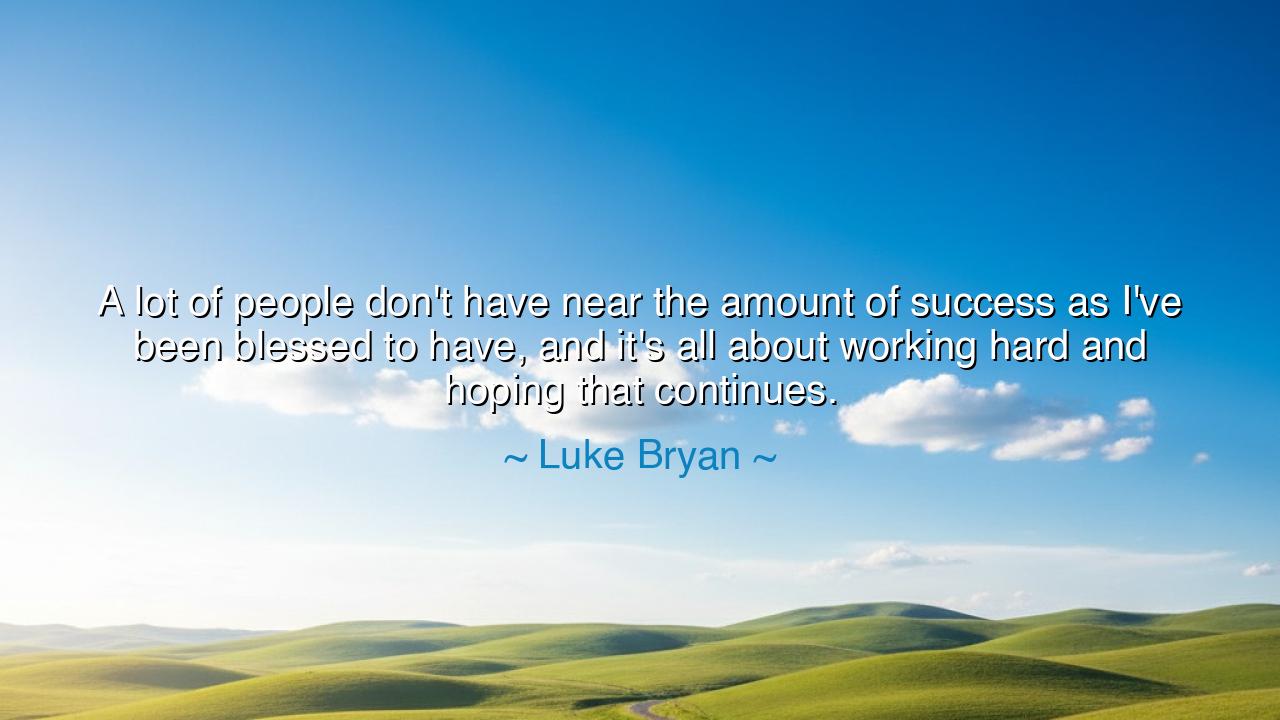
A lot of people don't have near the amount of success as I've
A lot of people don't have near the amount of success as I've been blessed to have, and it's all about working hard and hoping that continues.






Hear, O sons and daughters of tomorrow, the humble yet mighty words of the minstrel Luke Bryan: “A lot of people don’t have near the amount of success as I’ve been blessed to have, and it’s all about working hard and hoping that continues.” In these words, the singer does not exalt himself, but bows to the eternal laws of labor and providence. He speaks as one who has climbed the mountain, yet remembers the valley from which he came. His voice trembles not with arrogance but with gratitude, teaching us that success is never owned—it is only lent, and must be repaid with toil, humility, and vigilance.
To understand his meaning, let us look upon the first truth: success is not equally scattered like the rain that falls upon the fields. Many labor and yet reap little, while others, by fortune or by fate, find themselves raised upon the stage of recognition. But Luke Bryan reminds us that this blessing does not excuse idleness, nor permit pride. Instead, it demands a deeper responsibility—to continue in hard work, to remain steadfast, to treat every note sung and every task undertaken as a sacred offering. For when blessings are received, they are not chains to bind us in comfort—they are torches to be carried with care, lighting the path for others.
Consider the tale of Abraham Lincoln, born in the wilderness of a log cabin, armed with little more than determination and faith. Many around him shared his poverty, yet not all rose as he did. Why? Because he labored with unyielding spirit, reading by firelight, speaking with honesty, enduring trial after trial without surrender. His ascent to the highest seat of leadership was not the fruit of fortune alone, but of unbroken hard work and the hope that his labor might serve a greater good. Just as Luke Bryan sings of blessings preserved by labor, so Lincoln lived it: never ceasing, never resting, never believing that success was his right, but always treating it as a charge entrusted to him by destiny.
The second truth hidden in Bryan’s words is the power of hope. For though the farmer tills his soil, though the craftsman hones his blade, still the harvest depends upon forces beyond his control—the sun, the rains, the winds of fate. So too in life: man must give his strength, yet he must also lift his eyes heavenward, knowing that no toil guarantees triumph. Hope is the companion of hard work, the light that sustains the weary laborer when results are yet unseen. Without it, men fall into despair; with it, they endure, and sometimes, by grace, they find themselves blessed beyond measure.
There is also in this quote the virtue of humility. For Bryan, though he stands among the successful, confesses that many others labor just as fiercely, yet never taste such abundance. This is a sobering reminder: we must never despise the struggling, nor exalt ourselves above them. Fortune is a river that may bless one shore today and flood another tomorrow. Thus, the wise give thanks for their portion, however great or small, and remain mindful that their strength must be coupled with compassion.
And so, beloved listener, the lesson is clear. If you would walk in the path of success, bind yourself to hard work as to a faithful steed. Rise early, labor diligently, seek excellence in every act. Yet do not forget the twin virtues: hope, which keeps your spirit alive, and humility, which guards your soul from pride. For in this trinity of work, hope, and humility lies the true key to enduring blessing.
Take this into your daily life. Whatever your craft—whether you sing, build, teach, or labor in silence—give it the fullness of your effort. Let your hands be steady, your heart be patient, and your spirit remain grateful. Celebrate small victories as gifts, and never cease to dream of greater ones. And above all, remember the words of Luke Bryan: that success is not a crown to rest upon, but a field that must be tilled again and again, with hard work and hope as your eternal companions.






AAdministratorAdministrator
Welcome, honored guests. Please leave a comment, we will respond soon